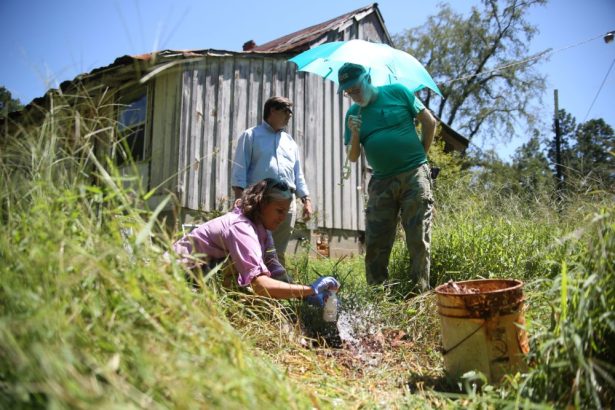State regulators last month approved a Georgia Power request to charge customers for the costs of cleaning up toxic waste produced by its coal-fired plants.
But an environmental organization is contesting that decision, claiming the utility failed to disclose how it would spend more than $500 million it had requested for environmental compliance.
The Sierra Club on Thursday appealed the Public Service Commission’s order that, if upheld, would let Georgia Power pass along $525 million in coal ash clean-up costs to ratepayers. The appeal came in the form of a petition for judicial review, filed in Fulton County Superior Court.

According to the Sierra Club, the PSC should not have granted a rate hike because the state’s environmental agency had yet to approve closure permits for most of Georgia Power’s coal ash ponds.
Georgia Power has announced plans to excavate the coal ash from 19 ponds and put the waste into lined facilities to prevent groundwater contamination. The utility’s other 10 ponds – including its largest ones at Plants Bowen and Scherer – hold most of the company’s coal ash. Georgia Power plans to permanently seal the ash in those 10 ponds without a protective liner between the waste and groundwater.
That has drawn objections in the Middle Georgia town of Juliette, where many residents believe their drinking wells are being contaminated by coal ash that’s in contact with the water table.

Further, the Sierra Club petition alleges that Georgia Power’s customers could soon be “paying for coal ash costs that are indefinite, uncertain and could change depending on the outcome of Georgia [Environmental Protection Division] review of the coal ash pond closure plans.”
Stephen Stetson, senior campaign representative with the Sierra Club’s Beyond Coal Campaign, told Georgia Health News that the utility should have “lawful permits” in hand before customers are forced to pay.
Once the rate hike is fully implemented, its customers are projected to see an annual rate increase of approximately $175, according to one PSC member.
“What Duke Energy did with North Carolina’s regulators is submit detailed plans as to how they’re going to clean up coal ash,” Stetson said. “But where Duke submitted details budgetary information about the costs, Georgia Power just submitted a total dollar value for each site.”
In a statement, Georgia Power spokesman John Kraft said the company’s rate hike proposal was “thoroughly discussed and evaluated” by the PSC, noting that the company “strongly disagree[s] with any claims to the contrary.”
PSC Chairman Chuck Eaton told GHN that the Environmental Protection Agency’s Aug. 31 deadline — requiring Georgia Power to either close unlined coal ash ponds or move that ash into a lined facility — had originally forced state regulators to act swiftly. The EPA has since proposed allowing utilities more time to close unlined coal ash ponds if they can prove it’s needed to properly dispose of waste.
“We felt it was the responsible thing to move forward,” Eaton said. “We’re going to go forward with shutting down these coal ash ponds.”
Georgia Power’s execs have said it will seal coal ash in place using “advanced engineering methods,” but have declined to share details, claiming that they are trade secrets. Environmental advocates contend those methods will offer fewer protections than a lined facility, and are being used to lower the utility’s costs.

The Southern Company, the Atlanta-based parent company of Georgia Power, estimates that between 2020 and 2024, it will spend more than $1 billion to clean up coal ash from plant sites in Georgia, Alabama and Mississippi, according to company filings. Georgia lawmakers are considering proposals to enact stricter regulations on Georgia Power, one of the state’s most influential corporations.
Beyond that, environmental advocates say the burden for residents would not only be financial, but also carry long-term health risks.
In Juliette – one community where Georgia Power plans to seal coal ash in place – residents allege the utility’s waste has contaminated their drinking water and are calling for the company to excavate its coal ash.
So far, Georgia Power has downplayed those concerns. In informational packets mailed to Juliette residents, as well as in an ad placed in a local newspaper, the company wrote, “no evidence” exists that Plant Scherer is responsible for contamination.
And in a message sent to its employees, the company accused the Altamaha Riverkeeper of spreading “completely false” information. The work by the Altamaha Riverkeeper, which has found concerning levels of hexavalent chromium in more than 80 percent of its wells tested, has spurred local officials to hire a Duke University expert to conduct further testing.
“I don’t know what the water did to me,” Mike Pless, a Juliette resident recently diagnosed with throat cancer, said at a recent town hall meeting. “But I don’t have a right to contaminate my and my friends’ water. Responsible citizens don’t that. Georgia Power doesn’t have the right to do that.”
Max Blau is an Atlanta-based journalist who writes narrative and investigative stories, which have recently appeared in Atlanta magazine, The New York Times, and The Washington Post.

